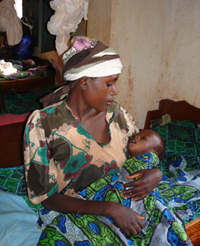|
|
|||||
|
|
On June 30, 2005, President Bush announced the President’s Malaria Initiative (PMI), a U.S. government program designed to cut malaria deaths in half in target countries in sub-Saharan Africa after 3 years of full implementation. PMI works in partnership with host country governments in Africa and builds on existing national programs. The U.S. Agency for International Development (USAID) and CDC, an agency of the U.S. Department of Health and Human Services (HHS), play central roles in PMI; together, they work with the National Institutes of Health, also an HHS agency; the U.S. Department of State; the U.S. Department of Defense; the Global Fund to Fight AIDS, TB, and Malaria; the World Bank; Roll Back Malaria; UNICEF; and other organizations. The first three countries to benefit from PMI are Angola, Tanzania, and Uganda. In 2007, PMI will target four additional highly malaria-endemic African countries, and in 2008, as many as eight more. The initiative is intended to eventually cover more than 175 million people in up to 15 African countries most affected by malaria. To make this a reality, the President pledged to increase U.S. funding of malaria prevention and treatment in sub-Saharan Africa by more than $1.2 billion over 5 years. The goal is to provide 85% of those especially vulnerable to malaria—pregnant women and children under 5 years—with the treatment and prevention interventions they need.
PMI Interventions
PMI at WorkPMI got off to a fast start, making visits to assess country needs within the first few months after the announcement and then shortly afterwards developing workplans in partnership with the countries. By the end of the year, activities had begun in two of the three target countries, followed by the third country in January 2006. Angola: On December 13, 2005, PMI began a large-scale indoor residual spraying campaign in Angola's southern provinces of Huila and Cunene. Ending in March 2006, the campaign targeted 120,000 households and more than 500,000 people. Leading up to the start of spraying, local Angolan workers were trained on how to use the spraying apparatus and how to apply insecticide. Tanzania: On December 19, 2005, a campaign to distribute long-lasting insecticide-treated mosquito nets (ITNs) kicked off at the Mahonda Police Football Grounds in Zanzibar. By the time the campaign ended in March 2006, approximately 300,000 ITNs had been distributed, enough for every pregnant woman and child under 5 years in the Zanzibar Isles. The nets were distributed through public clinics. The use of these nets is expected to save the lives of an estimated 2,000 children younger than 5 years over a period of 3 years.
The ITN campaign was a collaborative effort between the Government of Tanzania, the Government of Zanzibar, USAID, CDC, the Global Fund to Fight AIDS, TB, and Malaria, multilateral organizations, nongovernmental organizations, faith-based organizations, and the private sector. The nets were funded by both PMI and the Global Fund. Uganda: PMI had its Uganda launch in Kitgum on January 25, 2006, at the Labuje internally displaced persons’ camp. During the event, the first 100 insecticide-treated nets (ITNs) were given to camp residents, and this new coordinated effort to fight malaria in Uganda was celebrated. During the first year of PMI, more than 300,000 ITNs will be distributed in internally displaced persons’ camps. CDC ContributionsAs a public health agency with wide experience in malaria prevention and control, CDC brings to PMI strong and varied technical expertise that complements the contributions of other PMI partners. For example, CDC scientists are key participants in:
Keep abreast of new PMI activities on CDC's PMI page and PMI’s home page. Page last modified : April 10, 2006 Content source: Division of Parasitic Diseases National Center for Zoonotic, Vector-Borne, and Enteric Diseases (ZVED)
|
|
|||||||||||||||||||||||||||||||||||||||||||||||||||||||||
| Home | Policies and Regulations | Disclaimer | e-Government | FOIA | Contact Us | ||||||
|







